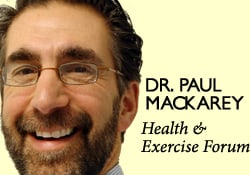This column is a monthly feature of “Health & Exercise Forum” in association with the students and faculty of Geisinger Commonwealth School of Medicine.
It would be very unlikely to find a person whose life has not been affected by someone with Alzheimer’s disease (AD). AD is one form of dementia. Currently, more than 4 million people in the USA have AD. One in ten people (10 percent) age 65 and older has Alzheimer's disease. About one-third of people age 85 and older (32 percent) have Alzheimer's disease. The risk increases with age and family history for the disease.
Important new research has
shown that there is another potential cause for AD and treatment trials have
been very promising. There is a growing body of scientific evidence that the
bacteria (P. gingivalis) most commonly associated with chronic gum (periodontal)
disease, can infect the brain and may have a role as a cause of Alzheimer’s.
WHAT ARE THE MAJOR RISK
FACTORS?
- Family History, Age
- High Blood Pressure – over a long period of time
- History of Head Trauma
- Female Gender – as women live longer
- Bacteria - P. gingivalis – commonly associated with gum disease (According to current research being investigated with clinical trials)
The Greater Boston Physicians for Social Responsibility and the Science and Environmental Health Network offer the following guidelines to reduce the Risk of Developing AD:
- Practice Good Nutrition All of Your Life: Provide and teach youngsters good eating habits. High calorie foods and drinks should be discouraged to prevent obesity and diabetes.
- Eat Lots of Fresh Fruits and Vegetables: Fruits and vegetables, especially those that are deep-green, provide essential antioxidants, vitamins, and other important micronutrients. Many contain healthy omega-3 fatty acids.
- Avoid Saturated and Trans Fat. Use Vegetable Oils Instead: A low-fat, plant-based diet with small amounts of dairy, lean meat and chicken is preferred. Avoid frequent use of oils high in omega-6 such as corn, safflower, sunflower, and peanut oils.
- Eat Foods High in Omega-3s: Eat fish at least once a week. For those who do not like fish, try fish oil. Limit use of fish that are high in mercury and PCB’s such as: swordfish, king mackerel, albacore and fresh tuna. Less contaminated fish are: haddock, Pollock and wild Alaskan salmon.
- Avoid Routine Consumption of Sugar:
- Table sugar, corn syrup, maple syrup, honey high in fructose cause rapid blood sugar elevation which is linked to obesity, type II diabetes, and heart disease.
- Consume Low-Glycemic Carbohydrates:
- Whole grains and legumes (chick peas and lentils) can help prevent sudden increases in blood sugar. Other examples are: brown rice, barley, oats, rye, buckwheat, fruits, non-starchy vegetables, pasta, winter squashes and tubers (yams, sweet potatoes).
- Get Food From Local and Organic Sources:Local growers and Co-ops tend to offer fresher foods with higher levels of nutrient and less pesticide use. NEPA has some great seasonal local farmer markets.
- Modest Consumption of Alcohol:
- Evidence supports the use of one-half to two drinks per day for adults. Red wine and green tea are recommended. Some studies show that caffeine may reduce the risk of Parkinson’s and AD.
- Avoid Food Additives, Such as Aluminum:
- While the evidence of the danger of cooking in aluminum pots may not be valid, recent evidence suggests that dietary aluminum may increase the risk of AD. For example, some baking powders, pancake and waffle mixes contain high levels of aluminum.
- Reduce Exposure to Toxicants:Toxic chemicals in the home, workplace and community can increase the risk of AD. Lead, solvents used in building and remodeling, and lawn and garden chemicals may be harmful.
- Increase Physical Activity:30 minutes of moderate aerobic exercise each day is very beneficial for physical and emotional wellness. It improves blood flow, releases endorphins and prevents obesity.
- Increase Social Activity:Social activity on a regular basis has been found to reduce the risk of AD. Volunteer, join a club, play a sport or game with a group, take classes and keep in touch with friends and family.
- Reduce Stress:Technology has put us on sensory overload. We must learn a new technological skill every week to keep up. Demand for immediate communication increases daily. We cannot escape for a moment. Make time everyday to relax, breathe deeply, listen to relaxing music, exercise or sit quietly.
- Exercise Your Brain:Some studies show that maintaining a healthy mind requires some work. Do crossword puzzles, word games, board games, and read books. Current wisdom suggests that learning something new is the most important thing to keep your mind healthy…time to learn to play the piano!
- Good Oral Hygiene:According to new research, a there may be a relationship between AD and the bacteria associated with gum disease. Be sure to practice good oral hygiene such as brushing and flossing your teeth after meals and before bed. Using mouth wash and visiting your dentist for regular check-ups is advised.
Medical Contributor: Mario Cornacchione, MD is the Assistant Chair
of Family Medicine, Associate Professor of Family Medicine at Geisinger
Commonwealth School of Medicine. Dr. Cornacchione is the Research Director at
the NEPA Memory & Alzheimer’s Center where he is the principal investigator
on the clinical trials studying new medications for the treatment of
Alzheimer’s disease.
NEPA Memory &
Alzheimer’s Center is recruiting subjects who are 55 to 80 years old with a
documented diagnosis of mild to moderate Alzheimer’s, among other criteria to
participate in the GAIN (GingipAIN Inhibitor for Treatment of Alzheimer’s
Disease) Trial.
To learn more,
contact: NEPA Memory & Alzheimer’s Center 220 S. River St. Plains, PA
18705, 570-262-0664 or visit www.GainTrial.com.
Sources: The HealthCentralNetwork, Inc; GainTrial; NEPA Memory & Alzheimer’s Center
Read Dr. Mackarey’s Health & Exercise Forum – Every Monday : .This article is not intended as a substitute for medical treatment. If you have questions related to your medical condition, please contact your family physician. For further inquires related to this topic email: drpmackarey@msn.com
Paul J. Mackarey PT, DHSc, OCS is a Doctor in
Health Sciences specializing in orthopaedic and sports physical therapy. Dr.
Mackarey is in private practice and is an associate professor of clinical
medicine at GCSOM.

